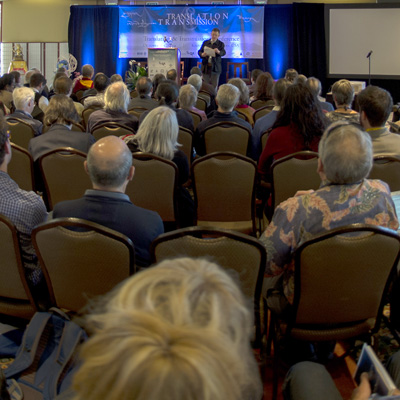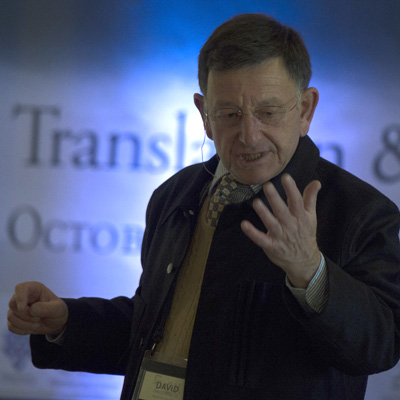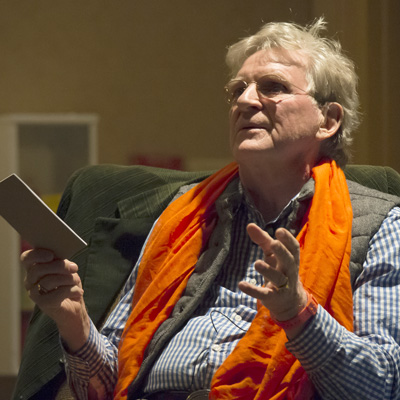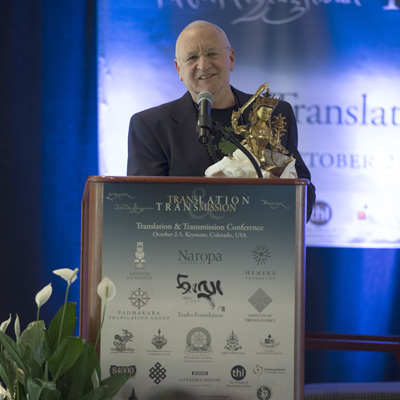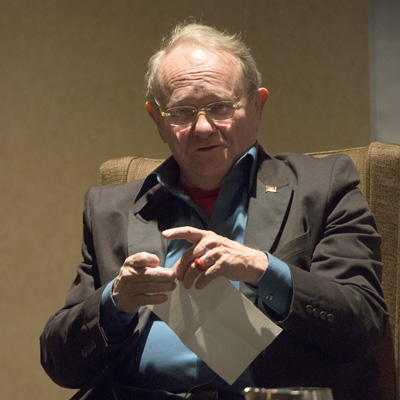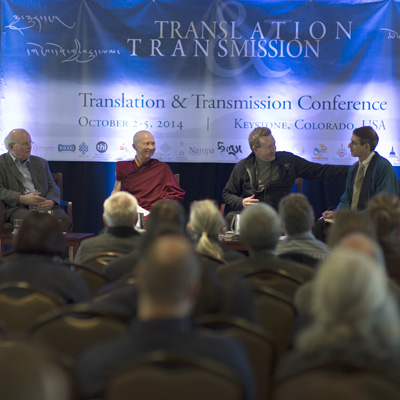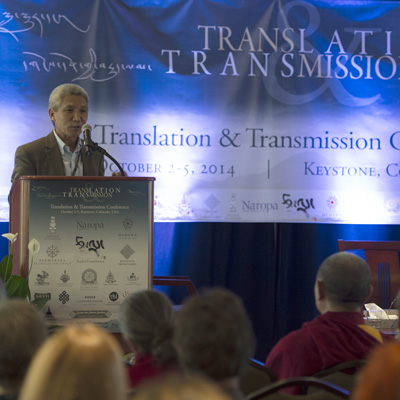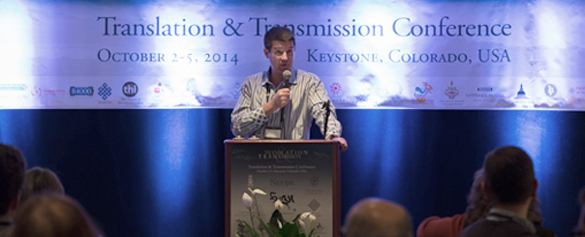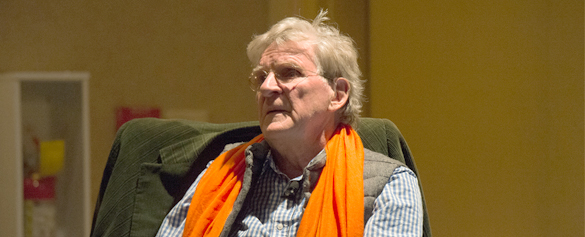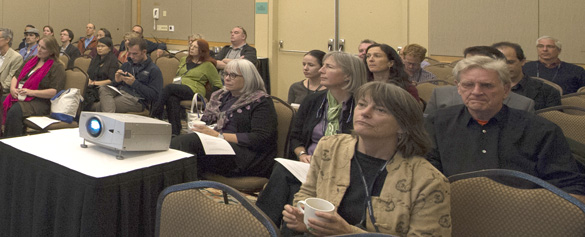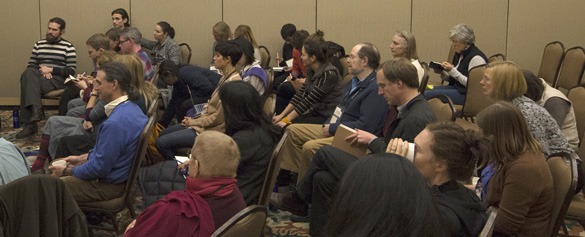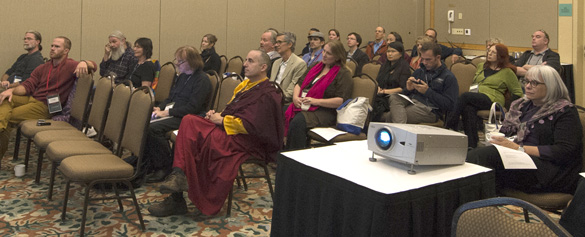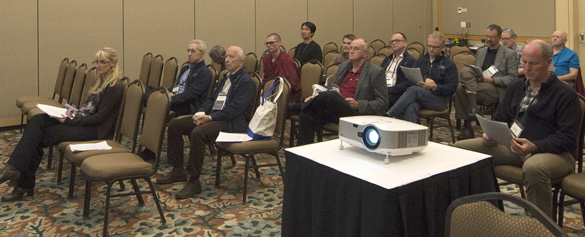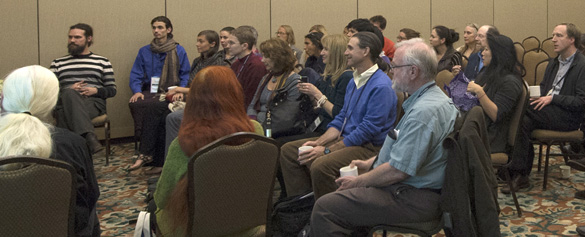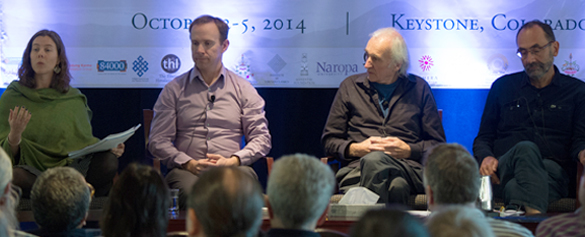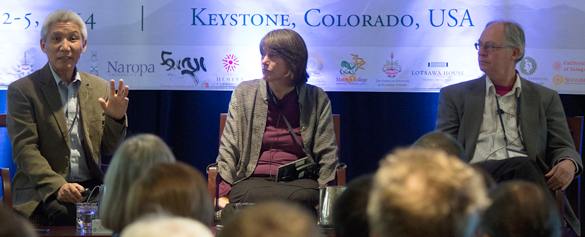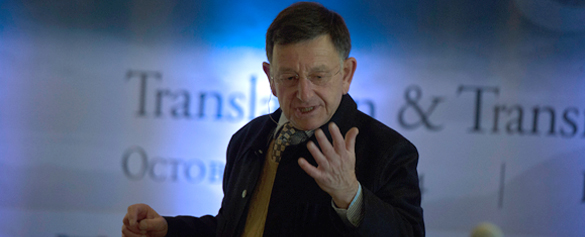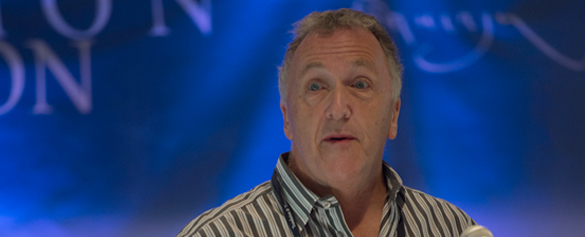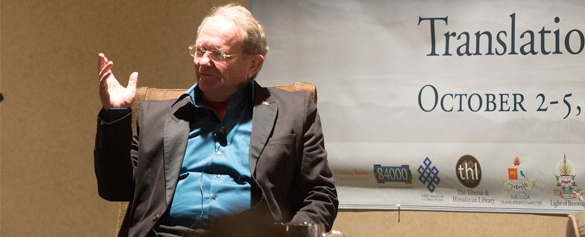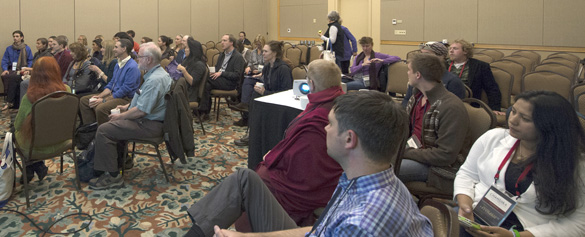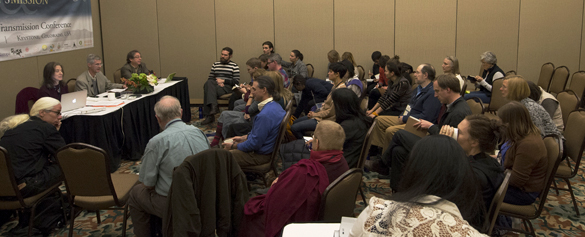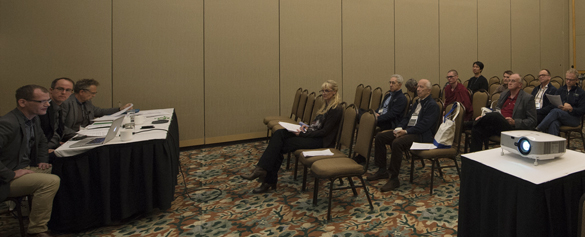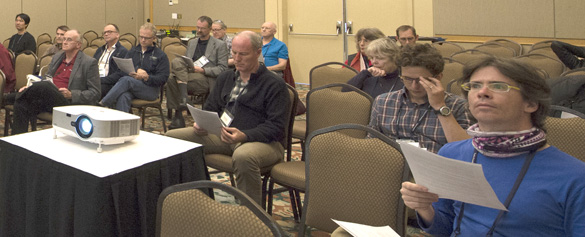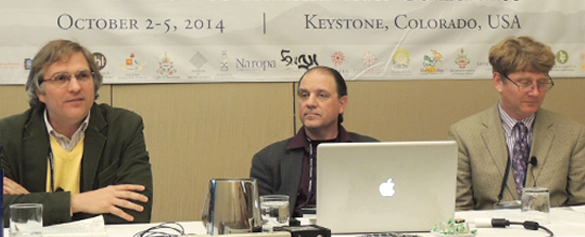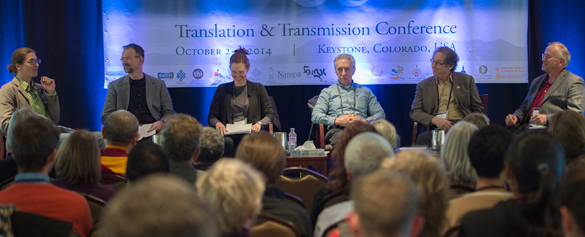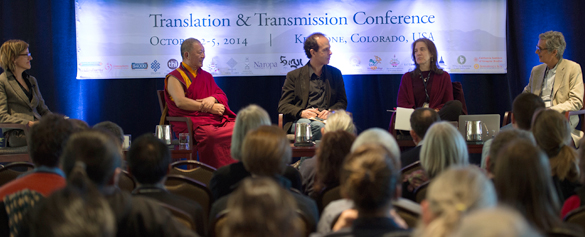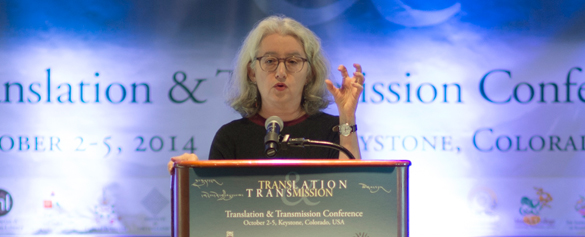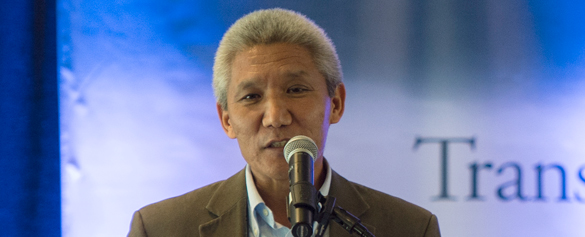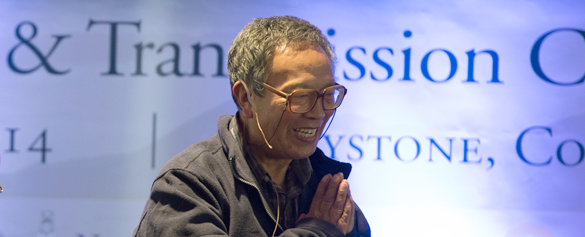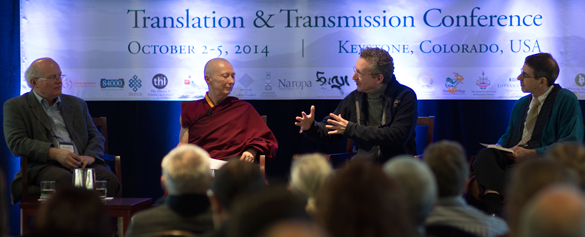New Update: Audio recordings only available here
The first meeting in the Translation & Transmission Conference series was held in the snowy peaks above 9,000 feet at the Keystone Conference Center amongst the bright fall colors of Colorado’s famous quaking aspens. Over two-hundred translators, practitioners, and scholars of Tibetan Buddhism traveled from around the world to share three days together in the mountains. Attendees reported that the meeting was a place for openly sharing knowledge, building connections amongst translation groups, scholars, and practitioners, and learning from peers. Some people deepened their connections and commitments to translating and transmitting Tibetan Buddhism to the West while others made connections for the first time and began projects that continue to this day.

On the first day of the conference, the group was treated to a special talk by a translator from outside of the Tibetan Buddhist world, Princeton professor of translation David Bellos, who reminded all translators everywhere to “be kind to your reader.” This concept of kindness spread throughout the rest of the conference and lead to positive discussion. By the second day, after an amazing evening event with Robert Thurman, a sense of community was growing and a moment was taken to reflect and recognize Sidney Piburn, creator of Snow Lion Publications, with a lifetime achievement award. There was also a special evening event with Jeffrey Hopkins and on the final day, deeper discussions were just getting started, as exemplified in the fantastic presentations on the plenary panel “Translation and Transmission: Authenticity & Myth Creation” with Karma Lekshe Tsomo, Don Lopez, Wulstan Fletcher, Jules Levinson, and Daniel Hirshberg. Thupten Jinpa closed the conference with a wonderful summary of the important themes, including translation, transmission, the combination of the two, and most significantly, the developing sense of community among those working diligently to present Tibetan Buddhism to the West.

The Conference Steering Committee
The Steering Committee meets regularly in the years leading up to each conference, designing meetings that will be inclusive of all traditions and approaches to the translation and transmission of Tibetan Buddhism to the West. Comprised of international representatives from some of the most well-established translation groups and university programs, these master translators have more than 300 years of combined experience translating the Tibetan language. The committee itself represents the community building effort at the heart of the conference series.
Thupten Jinpa (Institute of Tibetan Classics) Elizabeth Callahan (Tsadra Foundation) John Canti (Padmakara Translation Group & 84000) Wulstan Fletcher (Padmakara Translation Group & Tsadra Foundation) Holly Gayley (University of Colorado, Boulder) Sarah Harding (Naropa University & Tsadra Foundation) Marcus Perman (Tsadra Foundation)

The 2014 Conference Revisited
Thursday, October 2, 2014
WELCOME DAY
12:30 PM Welcome Lunch for Speakers and Moderators
6:30 PM Welcome Reception and Speeches with Eric Colombel
Friday, October 3, 2014
DAY ONE
8:30 AM Opening Remarks by Anthony Chapman
9:00 AM Keynote Lecture: Be Kind to Your Reader
11:00 AM Plenary Session 1: Translation: Theory and Praxis
2:00 PM Plenary Session 2: Traduttore, Traditore: The Role of the Translator
4:30 PM Workshops
- Translating Biographical and Historical Materials
- Translating Philosophical Materials A
- Translating Spiritual Instructions
- Translating Vajrayana Commentarial Materials
- Translating Canonical Materials: Sutra
8:00 PM Evening Event with Robert Thurman
Saturday, October 4, 2014
DAY TWO
9:00 AM Keynote Lecture: Questions about Transmission and Translation
10:30 AM Plenary Session 3: Transmission: Authenticity and Transformation
2:00 AM Plenary Session 4: Scholars, Translators, Practitioners: What is Our Role in Transmission
4:30 PM Workshops:
- Translating Canonical Materials: Tantra
- Translating Poetic and Inspirational Materials
- Translating Philosophical Materials B
- Translating Sadhanas and Rituals
- Translating Abhidharma Materials
8:00 PM Evening Event with Jeffrey Hopkins
Sunday, October 5, 2014
DAY THREE
9:00 AM Plenary Session 5: Translation and Transmission
11:30 AM Interview: with Alak Zenkar Rinpoche
1:00 PM Concluding Address by Thupten Jinpa
Speakers and Facilitators
Search speakers details
David Bellos
Princeton University
David Bellos is professor of French and Comparative Literature at Princeton, where he also directs the Program in Translation and Intercultural Communication. He has translated works by Georges Perec, Ismail Kadare, Fred Vargas and many others and is also the author of literary biographies of Georges Perec, Jacques Tati, and Romain Gary. His irreverent essay on translation, “Is That A Fish In Your Ear? Translation and the Meaning of Everything,” was published in 2011.
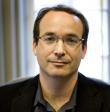
Andrew Quintman
Yale University
Quintman is associate professor in the Department of Religious Studies at Yale University, specializing in the Buddhist traditions of Tibet and the Himalaya. For seven years he served as the academic director of the School for International Training’s Tibetan Studies program based in Kathmandu. He is the author of The Yogin and the Madman: Reading the Biographical Corpus of the Great Tibetan Saint Milarepa (Columbia University Press 2014). His English translation of The Life of Milarepa (2010) was published in the Penguin Classics series. He is currently writing a history of Drakar Taso Monastery in Tibet southern borderland and a study of the Buddha’s life story through the visual and literary materials of Jonang Monastery in western Tibet.
Tyler Dewar
Nitartha Translation Network
Tyler Dewar is an oral interpreter and translator of Tibetan Buddhist teachings. A senior teacher in the Nalandabodhi community, he has been practicing and studying Buddhism since 1996. Tyler was appointed by Dzogchen Ponlop Rinpoche as a Nalandabodhi teacher in 2005 and, as part of this appointment, received the title Mitra, or “spiritual friend.” He has written for Buddhadharma, Bodhi, and the Shambhala Sun and published two volumes of translation, Trainings in Compassion (2004) and The Karmapa’s Middle Way (2008), with Snow Lion Publications. Tyler is a faculty member and translator at Nitartha Institute and is currently working on several translation projects. When not engaged in written translation work at his home in Seattle, Washington, he teaches and translates throughout North America the world.
Dan Martin
Independent
Dan Martin, PhD in Tibetan Studies, Indiana University, 1991. Researcher and translator with many interests in Tibetan religions, literature, and cultural topics. Currently working on a translation of a lengthy 13th-century history for the Library of Tibetan Classics series.
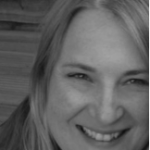
Amelia Hall
Naropa University
Amelia Hall became a student of Thinley Norbu Rinpoche and Lama Tharchin Rinpoche in 2001. In 2005 she embarked upon a master’s degree in Tibetan and Himalayan Studies from the University of Oxford. She obtained her doctorate from Oxford in 2012, her dissertation, Revelations of a Modern Mystic: The Life and Legacy of Kun bzang bde chen gling pa 1928-2006, translates and reflects upon the biography of this Tibetan Buddhist visionary and the assimilation of Tibetan Buddhism in contemporary North America. She currently teaches courses on Buddhism and Tibetan language at Naropa University. In addition she directs research projects for the Naksang Foundation. Current projects focus on the translation and study of biographies, historical texts, and maps relating to the spread of Buddhism in the 17th Century CE from Tibet and Bhutan to Arunachal Pradesh. She is also an affiliated scholar at the Tibetan and Himalayan Studies Centre at Wolfson College, University of Oxford.
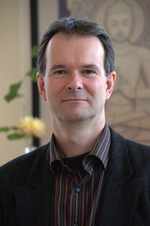
Karl Brunnhölzl
Nitartha Translation Network
Karl was originally trained, and worked, as a physician for twenty years. He took Buddhist refuge vows in 1984, and received his Buddhist and Tibetan language training mainly at Marpa Institute For Translators in Kathmandu, Nepal. He also studied at Hamburg University, Germany. Karl has served as a translator, interpreter, and Buddhist teacher mainly in Europe, India, and Nepal, and has acted as one of the main translators and teachers at Nitartha Institute. In addition, he regularly taught at Gampo Abbey’s Vidyadhara Institute. He is the author of several books on Buddhism, such as The Center of the Sunlit Sky, Straight from the Heart, In Praise of Dharmadhātu, Gone Beyond, Mining For Wisdom Within Delusion, and The Heart Attack Sutra. He currently lives in Seattle. He also teaches weekend seminars and Nitartha Institute courses in Nalandabodhi centers, mainly in the US, Canada, and Mexico.
John Canti
Padmakara Translation Group; 84000
In 1970, while studying medicine at Cambridge, John Canti first met his Buddhist teachers, and started to practice under their guidance. After hospital work in London and Cambridge, he moved in the late seventies to eastern Nepal to establish tuberculosis programs in two remote hill districts. Beginning in 1980, he underwent two three-year retreats in the Dordogne, France. Emerging from retreat at the end of the 80s, he helped found the Padmakara Translation Group, of which he is now president, and remains an active translator. From 2001 to 2014 he was a Fellow of the Tsadra Foundation. He is editorial director of 84000 and serves on the working committee as chair of the editorial section. He is based mainly in France but has spent long periods in Nepal and India. As well as his 84000 work, John is working on Mipham’s commentary on the Ratnagotravibhāgottaratantraśāstra.
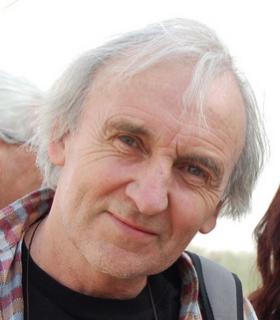
Gavin Kilty
Institute of Tibetan Classics; FPMT
Gavin Kilty has been a full-time translator for the Institute of Tibetan Classics since 2001. Before that he lived in Dharamsala, India, for fourteen years, where he spent eight years training in the traditional Geluk monastic curriculum through the medium of class and debate at the Institute of Buddhist Dialectics. He teaches Tibetan language courses in India and Nepal, and is a translation reviewer for the organization 84000, Translating the Words of the Buddha. Included among his published translations are Ornament of Stainless Light, Mirror of Beryl, Lamp Illuminating the Five Stages, and Splendor of an Autumn Moon.
Christian Wedemeyer
University of Chicago
Christian K. Wedemeyer is associate professor of the history of religions at the University of Chicago Divinity School. He is the author of Making Sense of Tantric Buddhism: History, Semiology, and Transgression in the Indian Traditions (Columbia University Press; winner of the 2013 American Academy of Religion Award for Excellence in the Study of Religion) and Āryadeva’s Lamp That Integrates the Practices (Caryāmelāpakapradīpa): The Gradual Path of Vajrayāna Buddhism According to the Esoteric Community Noble Tradition (AIBS, 2007). He is currently completing another volume of translations: Tantric Practices of the Esoteric Community: Ritual and Exegetical Works of the Noble Tradition.
Holly Gayley
University of Colorado, Boulder
Holly Gayley is Assistant Professor of Buddhist Studies at the University of Colorado, Boulder. Her research focuses on the revitalization of Buddhism in the Tibetan region of Golok since the 1980s. She completed her Masters in Buddhist Studies at Naropa University in 2000 and PhD at Harvard University in Tibetan and Himalayan Studies in 2009. Currently, she is finalizing a manuscript on the life and love letters of the contemporary female tertön, Khandro Tāre Lhamo, and her consort Namtrul Rinpoche and translating texts of advice to the laity by Khenpo Jigme Phuntsok and his successors at Larung Buddhist Academy in Serta. In 2013, Holly co-organized the conference, “Translating Buddhist Luminaries,” which brought translators and scholars into a conversation about the art of translation in relation to pithy texts of advice by nineteenth century ecumenical masters such as Patrul Rinpoche, Ju Mipham, and Jamgön Kongtrul. The translations will appear in an edited volume with Wisdom Publications.

David Gray
Santa Clara University
David B. Gray is an Associate Professor of Religious Studies at Santa Clara University. His research explores the development of tantric Buddhist traditions in South Asia, and their dissemination in Tibet and East Asia, with a focus on the Yoginītantras, a genre of Buddhist tantric literature that focused on female deities and yogic practices involving the subtle body. He is the author of both The Cakrasamvara Tantra: A Study and Annotated Translation (New York: American Institute of Buddhist Studies, 2007), and The Cakrasamvara Tantra: Editions of the Sanskrit and Tibetan Texts (New York: American Institute of Buddhist Studies, 2012).
Lama Chonam
Light of Berotsana
Lama Chönam, Chöying Namgyal, was born in the Golog area of eastern Tibet in 1964. His root teacher, Khenpo Münsel, was a direct disciple of Khenpo Ngagchung and was himself one of the great authentic Dzogchen masters of the twentieth century. Lama Chönam escaped Tibet in 1992 and later came to the United States, where he resides today. Over the past sixteen years Lama Chönam has been teaching Tibetan language and the Buddhadharma. He is one of the founders of the Light of Berotsana Translation Group.

Klaus-Dieter Mathes
University of Vienna
Prof. Dr. Klaus-Dieter Mathes is the Head of the Department of South Asian, Tibetan and Buddhist Studies at the University of Vienna. His current research deals with Tibetan Madhyamaka, Yogācāra and the interpretations of Buddha nature from the 14th to the 16th century. He obtained a Ph.D. from Marburg University with a study of the Yogācāra text Dharmadharmatāvibhāga (published in 1996 in the series Indica et Tibetica). His habilitation thesis was published by Wisdom Publications under the title A Direct Path to the Buddha Within: Gö Lotsawa´s Mahāmudrā Interpretation of the Ratnagotravibhāga (Boston: 2008). Recent publications include The Other Emptiness: Rethinking the Zhentong Buddhist Discourse in Tibet (SUNY, 2019) and A Fine Blend of Mahāmudrā and Madhyamaka. Maitrīpa’s Collection of Texts on Non-conceptual Realization (Amanasikāra) (Vienna, 2015). He is also a regular contributor to the Journal of the International Association of Buddhist Studies.
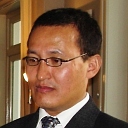
Dorji Wangchuk
Khyentse Center for Tibetan Buddhist Textual Scholarship; University of Hamburg
After completing a nine-year course in the study of Tibetan Buddhism from a traditional Tibetan Buddhist monastic seminary in South India (i.e. sNga ’gyur mtho slob mdo sngags rig pa’i ’byung gnas gling, Bylakuppe, Mysore), Dorji Wangchuk studied Classical Indology (first major, with a focus on Buddhist Studies) and Tibetology (second major) at the University of Hamburg (MA, 2002). He wrote his doctoral dissertation on “The Resolve to Become a Buddha: A Study of the Bodhicitta Concept in Indo-Tibetan Buddhism” and received his PhD from the same University in 2005. Between 1992 and 1996, he taught Tibetan Buddhist monks and nuns in monastic seminaries in India. Since 1998, he has been teaching and researching at the University of Hamburg in various capacities. He also taught a term each at the University of Copenhagen and McGill University. Currently he is a professor for Tibetology at the Department of Indian and Tibetan Studies, Asia-Africa Institute, Faculty of Humanities, University of Hamburg.
Karma Lekshe Tsomo
University of California, San Diego
Karma Lekshe Tsomo is a professor of Theology and Religious Studies at the University of San Diego. She received novice precepts from the Sixteenth Gyalwang Karmapa in France in 1977 and full ordination in Korea in 1982. She studied Buddhism in Dharamsala for fifteen years and received a doctorate in Comparative Asian Philosophy from the University of Hawai`i in 2000. She is a founder and past president of Sakyadhita International Association of Buddhist Women (www.sakyadhita.org) and director of Jamyang Foundation (www.jamyang.org), an innovative education project for women in developing countries. She has edited a number of books on women in Buddhism.
Sarah Harding
Tsadra Foundation Fellow; Naropa University
Sarah Harding has been a Buddhist practitioner since 1974 and has been teaching and translating since completing a three-year retreat in 1980 under the guidance of Kyabje Kalu Rinpoche. Her publications include Creation and Completion, The Life and Revelations of Pema Lingpa, Treasury of Knowledge: Esoteric Instructions, Machig’s Complete Explanation, and Niguma, Lady of Illusion. She is an associate professor at Naropa University in Boulder, Colorado, where she has been teaching since 1992, and has been a fellow of the Tsadra Foundation since 2000. Currently she is working on translating the zhi byed and gcod sections of the gdams ngag rin po che’i mdzod.
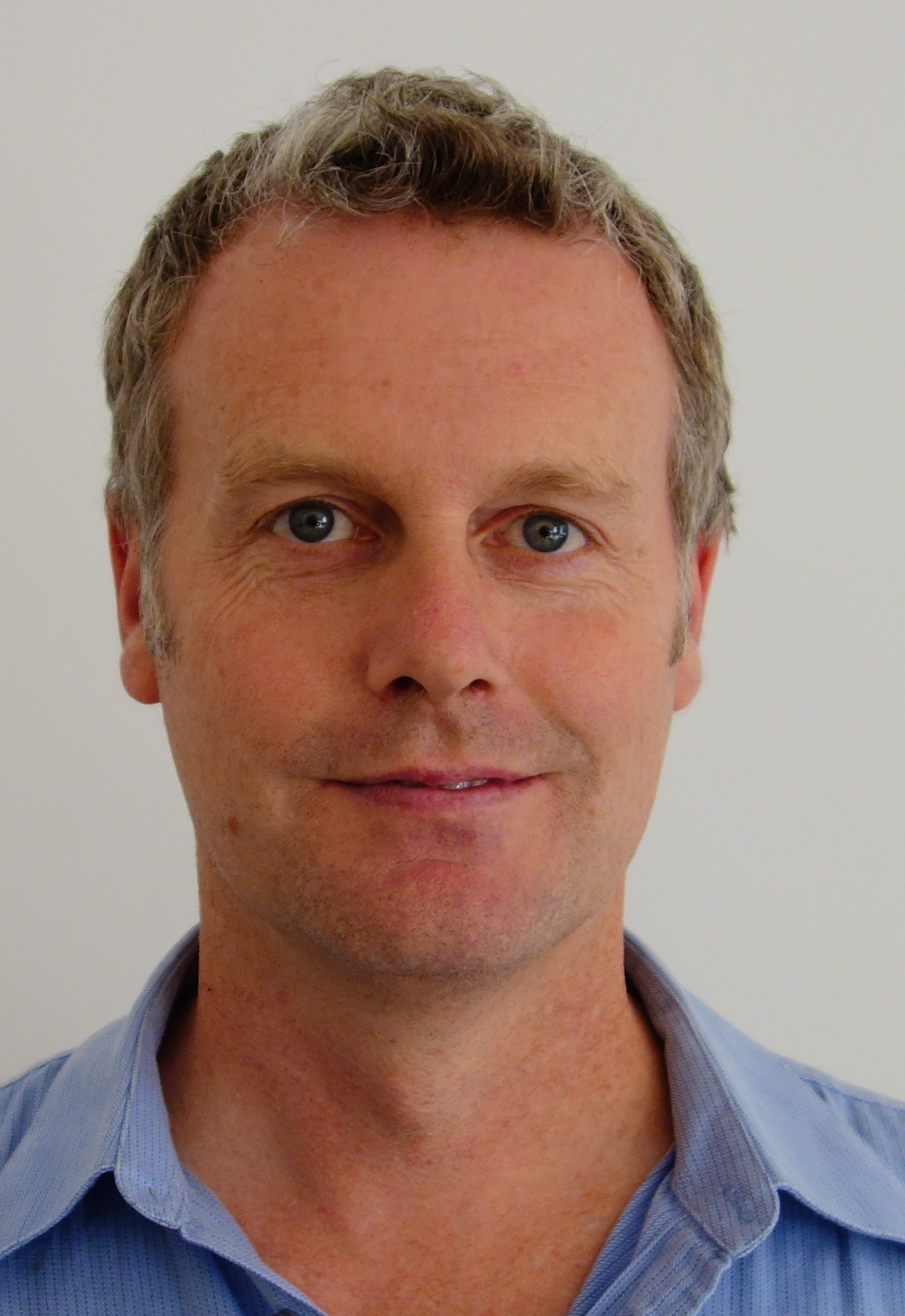
Jacob Dalton
University of California, Berkeley
Jacob Dalton, Associate Professor and Khyentse Foundation Distinguished Professor of Tibetan Buddhism, received his PhD in Buddhist Studies from the University of Michigan in 2002. After working for three years (2002-05) as a researcher with the International Dunhuang Project at the British Library, he taught at Yale University (2005-2008) before moving to Berkeley. He works on Nyingma religious history, tantric ritual, early Tibetan paleography, and the Dunhuang manuscripts. He is the author of The Taming of the Demons: Violence and Liberation in Tibetan Buddhism (Yale University Press, 2011) and co-author of Tibetan Tantric Manuscripts from Dunhuang: A Descriptive Catalogue of the Stein Collection at the British Library (Brill, 2006). He is currently working on a study of tantric ritual in the Dunhuang manuscripts. His most recent translation work has focused on the recently discovered biographies of two tenth-century Tibetan figures: Nupchen Sangye Yeshe and Lha Lama Yeshe Ö.
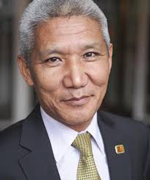
Thupten Jinpa
Institute of Tibetan Classics
Thupten Jinpa, PhD, received his early education as a monk and obtained the Geshe Lharam degree from Ganden Monastic University in South India. He holds a B.A. in philosophy and a PhD in religious studies, both from Cambridge University. Jinpa is an adjunct professor at McGill University. He is associated with the Center for Compassion and Altruism Research and Education at Stanford University, and is the main author of its Compassion Cultivation Training program. He is the board chair of the Mind and Life Institute, the founder and president of the Institute of Tibetan Classics, and the general editor for The Library of Tibetan Classics. Since 1985 he has been the principal English translator to H.H. the Dalai Lama. Jinpa’s published works include translations of numerous books by the Dalai Lama, Songs of Spiritual Experience, Mind Training: The Great Collection, and The Book of Kadam. His Tibetan publications include a first ever introduction to Buddhism in vernacular Tibetan and a comprehensive modern Tibetan grammar. Most recently he co-translated Grains of Gold by Gendün Chöpel.

Thomas Doctor
Dharmachakra Translation Committee
Thomas Doctor has studied Buddhist philosophy at Ka-Nying Shedrub Ling Monastery in Kathmandu since the late 1980s. He teaches in the Rangjung Yeshe Institute graduate program and works for the Dharmachakra Translation Committee (DTC). Thomas received his BA and MA degrees in Tibetan Studies from the University of Copenhagen and his PhD in Buddhist Studies from the University of Lausanne. He is the author of Reason and Experience in Tibetan Buddhism: Mabja Jangchub Tsöndrü and the Traditions of the Middle Way (Routledge 2013). With DTC he has translated sūtras and tantras for the 84000 Project, as well as classics of Buddhist philosophy, such as Ornament of Reason (Mūlamadhyamakakārikā with commentary by Mabja Jangchub Tsöndrü, Snow Lion 2011) and Ornament of the Great Vehicle Sūtras (Mahāyānasūtrālaṃkāra with commentaries by Khenpo Shenga and Ju Mipham, Shambhala 2014).
John Dunne
Emory University
John Dunne (PhD 1999, Harvard University) is an Associate Professor in the Department of Religion at Emory University, where he co-founded the Collaborative for Contemplative Studies. Previously he held a research post at the Université de Lausanne (Switzerland) and conducted doctoral research at the Central University for Tibetan Studies (Sarnath). Before Emory, he taught at at the University of Wisconsin-Madison. His work focuses on Buddhist philosophy and contemplative practice, especially in dialog with Cognitive Science. His publications include a monograph on Dharmakīrti (Foundations of Dharmakīrti’s Philosophy, 2004) and cognitive scientific studies of Buddhist contemplative practice with colleagues from the Center for Investigating Healthy Minds and the Mind and Life Institute. His translations from Sanskrit and Tibetan have appeared in various publications (The Precious Garland: An Epistle to a King, 1997), and he has served as an oral interpreter for numerous Tibetan teachers including H.H. the Dalai Lama. His current translation work is on Candrakīrti’s Prasannapadā.
Christian Bernert
Chödung Karmo Translation Group; IBA
Christian Bernert (MA) comes from Austria where he studied Tibetology at the University of Vienna until 2009. He embarked on the Buddhist path in 1999 under the guidance of Khenchen Sherab Amipa Rinpoche. Since 2001 he has been studying at IBA, where he worked as language program coordinator and translator. Christian is a founding member of the Chödung Karmo Translation Group.
Art Engle
Tsadra Foundation Fellow
Artemus B. Engle began studying the Tibetan language in Howell, New Jersey in early 1971 at Labsum Shedrup Ling, the precursor of the Tibetan Buddhist Learning Center. In 1972 he became a student of Sera Mey Khensur Lobsang Tharchin Rinpoche, a relationship that spanned more than thirty years. In 1975 he enrolled in the Buddhist Studies program at the University of Wisconsin in Madison and received a PhD in 1983. Since the mid 1980s he taught Tibetan language and Buddhist doctrine at the Mahayana Sutra and Tantra Center in Howell, New Jersey. In 2005 he became a Tsadra Foundation Translation Fellow and has worked primarily on the Pañcaskandhaprakarana and the Bodhisattvabhūmi.
Larry Mermelstein
Nālandā Translation Committee
Beginning in 1971, Larry Mermelstein became a close student of the Venerable Chögyam Trungpa Rinpoche, Tibetan Buddhist meditation master and scholar, and he is empowered as a senior teacher, or acharya, by Sakyong Mipham Rinpoche. He has been the Executive Director of the Nalanda Translation Committee since 1978, the same year he became an editor at Shambhala Publications, where he continues to serve as a consulting editor. He was among the founding administrators and later a language teacher (Sanskrit and Tibetan) at Naropa University, and he was a member of the Vajradhatu/Shambhala International board of directors for many years.
Alak Zenkar Rinpoche
Nyingmapa scholar; Columbia University
Alak Zenkar Rinpoche, among his many activities, is the director and founder of the Project for Researching and Making Available Rare Texts in Chengdu, China. In addition, he compiled a dictionary of terms from the Gesar epic in Tibetan and Chinese. He was the co-founder, vice-principal, and Professor of Tibetology at the Sichuan Tibetan Language School in Chengdu, Sichuan, where he established a school for advanced studies in Tibetan language and culture.
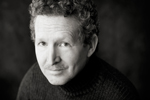
Donald Lopez, Jr.
University of Michigan
Donald Lopez is the Arthur E. Link Distinguished University Professor of Buddhist and Tibetan Studies at the University of Michigan, where he is chair of the Department of Asian Languages and Cultures. He was elected to the American Academy of Arts and Sciences in 2000. His most recent translations, both with Thupten Jinpa, are Grains of Gold: Tales of a Cosmopolitan Traveler (the Gtam rgyud gser gyi thang ma of A mdo Dge ’dun chos ’phel) and Ippolito Desideri’s refutation of rebirth and emptiness, Dispelling the Darkness: A Jesuit’s Quest for the Soul of Tibet. Forthcoming translations include the grub mtha’ of Lcang skya rol pa’i rdo rje.
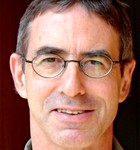
Jules Levinson
UMA Institute for Tibetan Studies
Jules B. Levinson graduated from Princeton University in 1975 and soon thereafter began studying at the University of Virginia under the guidance of Dr. Jeffrey Hopkins and the eminent Tibetan scholars invited by the University’s Center for South Asian Studies. He received a doctoral degree in Religious Studies from the University of Virginia in 1994. At present he lives and works in Boulder, Colorado.
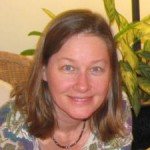
Sara McClintock
Emory University
Sara McClintock is Associate Professor of Religion at Emory University, where she teaches courses in Indian and Tibetan Buddhism and interpretation theory in the study of religion. She obtained her bachelor degree in fine arts from Bryn Mawr College (1983), her masters degree in world religions from Harvard Divinity School (1989), and her doctorate in religion from Harvard University (2002). Her interests include narrative, philosophy, and contemplative practices, with particular focus on issues of rationality, rhetoric, reading, embodiment, emptiness, and ethics. She is author of Omniscience and the Rhetoric of Reason: Śāntarakṣita and Kamalaśīla on Rationality, Argumentation, and Religious Authority (2010) and co-editor with Georges Dreyfus of The Svātantrika-Prāsaṅgika Distinction: What Difference Does a Difference Make? (2003). She is co-translator with John Dunne of Nāgārjuna’s Ratnāvalī and is in the early stages of a new research and translation project on the Avikalpapraveśadhāraṇīṭīkā of Kamalaśīla.
Tom Tillemans
University of Lausanne; 84000
Tom J.F. Tillemans is Professor Emeritus of Buddhist Studies in the Department of South Asian Languages and Cultures at the University of Lausanne in Switzerland. The focus of his research has been on Buddhist logic and epistemology, Madhyamaka philosophy, and comparative philosophy. He was from 1998 until 2006 co-editor of the Journal of the International Association of Buddhist Studies. Born in 1950 in the Netherlands and raised in Canada, he now serves as the editor in chief for the 84000 project tasked with translating the scriptures of the Buddhist canon. Publications include Scripture, Logic, Language: Essays on Dharmakīrti and his Tibetan Successors (1999); Materials for the Study of Āryadeva, Dharmapāla, and Candrakīrti (1990, reprint 2008); Persons of Authority (1993); Agents and Actions in Classical Tibetan (with Derek Herforth, 1989); Dharmakīrti’s Pramāṇavārttika: An Annotated Translation of the Fourth Chapter (parārthānumāna) (2000); Apoha. Buddhist Nominalism and Human Cognition (with Mark Siderits and Arindam Chakrabarti, 2011); Moonshadows: Conventional Truth in Buddhist Philosophy (with Jay Garfield, Georges Dreyfus, et al., 2011).
Ringu Tulku
Bodhicharya International
Ringu Tulku Rinpoche is a Tibetan Buddhist Master of the Kagyu Order. He was trained in all schools of Tibetan Buddhism under many great masters including H.H. the Sixteenth Gyalwang Karmapa and H.H. Dilgo Khyentse Rinpoche. He took his formal education at Namgyal Institute of Tibetology, Sikkim and Sampurnananda Sanskrit University, Varanasi, India. He served as Tibetan Textbook Writer and Professor of Tibetan Studies in Sikkim for twenty-five years. Since 1990, he has been traveling and teaching Buddhism and meditation in Europe, America, Canada, Australia, and Asia. He participates in various interfaith and ‘Science and Buddhism’ dialogues and is the author of a number of books on Buddhist topics. These include Path to Buddhahood, Daring Steps, The Ri-me Philosophy of Jamgön Kongtrul the Great, Confusion Arises as Wisdom, the Lazy Lama series and the Heart Wisdom series, as well as several children’s books, available in Tibetan and European languages.
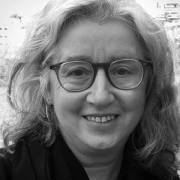
Janet Gyatso
Harvard University
Janet Gyatso (BA, MA, PhD, University of California at Berkeley) is a specialist in Buddhist studies with concentration on Tibetan and South Asian cultural and intellectual history. Her books include Apparitions of the Self: The Secret Autobiographies of a Tibetan Visionary; In the Mirror of Memory: Reflections on Mindfulness and Remembrance in Indian and Tibetan Buddhism; and Women of Tibet. She has recently completed a new book, Being Human in a Buddhist World: An Intellectual History of Medicine in Early Modern Tibet, which focuses upon alternative early modernities and the conjunctions and disjunctions between religious and scientific epistemologies in Tibetan medicine in the sixteenth–eighteenth centuries.
Tom Yarnall
AIBS; Columbia University
Dr. Tom Yarnall is an Associate Research Scholar and Adjunct Professor at Columbia University, where he specializes in Indo-Tibetan Buddhism. He works with the Columbia Center for Buddhist Studies and the American Institute of Buddhist Studies as the Executive Editor for the “Treasury of the Buddhist Sciences” series. Dr. Yarnall began his engagement with Buddhism in the late 70s, studying with Tibetan Lamas from all four orders while earning a BA in Religion at Amherst College in 1983. He later earned an MA, MPhil, and ultimately a PhD from Columbia University in 2003. Dr. Yarnall’s own scholarly work has focused on Mādhyamika philosophy, Buddhist ethics, and Tantric materials of the Unexcelled Yoga class. His study and translation of the creation stage chapters of Tsong Khapa’s Great Treatise on the Stages of Mantra (sngags rim chen mo) was published in the “Treasury of the Buddhist Sciences” series in 2013.
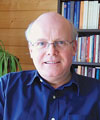
Wulstan Fletcher
Padmakara Translation Group; Tsadra Foundation Fellow
Wulstan Fletcher studied modern languages and theology in Oxford and Rome. He completed a three year meditation retreat in Chanteloube, France 1986-1989 and is a member of the Padmakara Translation Group. He has been a Tsadra Fellow since 2001. Wulstan has completed several Tibetan-English translation projects in collaboration with Helena Blankleder, including The Wisdom Chapter: Jamgön Mipham’s Commentary on the Ninth Chapter of The Way of the Bodhisattva (2017), Treasury of Precious Qualities (Book 1, 2010; Book 2, 2013), The Root Stanzas of the Middle Way (2008), The Way of the Bodhisattva (revised 2006), The Nectar of Manjushri’s Speech (2007), White Lotus (2007), Introduction to the Middle Way (2005), The Adornment of the Middle Way (2005), Food of Bodhisattvas: Buddhist Teachings on Abstaining from Meat (2004), and Counsels from My Heart (2003). Wulstan is currently working on Longchenpa’s sems nyid ngal gso and Mipham’s brgal lan nyin byed snang ba.
Douglas Duckworth
Temple University
Douglas Duckworth is Assistant Professor in the Department of Religion at Temple University. He is the author of Mipam on Buddha-Nature: The Ground of the Nyingma Tradition (SUNY, 2008) and Jamgön Mipam: His Life and Teachings (Shambhala, 2011). He also introduced and translated Distinguishing the Views and Philosophies: Illuminating Emptiness in a Twentieth-Century Tibetan Buddhist Classic by Bötrül (SUNY, 2011).
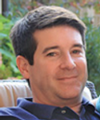
Eric Colombel
Tsadra Foundation (President and Founder)
Eric Colombel is the president and founder of Tsadra Foundation, a nonprofit trust established in 2000 to provide vital funding for the combined study and practice of Tibetan Buddhism in the west. He has been a student of Buddhism from the age of 17, studying the Tibetan language at INALCO in Paris and Buddhist theory and practice at various Buddhist centers, receiving teachings and transmissions from teachers of all the principal Tibetan traditions. Educated in IT, as a young student in Paris he created the first digital script for the Bhutanese Dzong-kha language system. Later in New York he was instrumental in developing the digital architecture for the then radically new Asian Classics Input Project. In 2000 he decided to use a western philanthropic model as a means for contributing to the furthering of wisdom and compassion in Western minds through the creation of Tsadra Foundation.
Andreas Doctor
Dharmachakra Translation Committee
Andreas Doctor (PhD, University of Calgary) is director of Dharmachakra Translation Committee, Kathmandu, Nepal. He also serves on the editorial committee of 84000: Translating the Words of the Buddha. He is currently working with the Dharmachakra Translation Committee on translations of several sūtras and tantras from the Tibetan canon as part of the 84000 project to translate the Tibetan Kangyur into English.
Peter Alan Roberts
Independent
Peter Alan Roberts was born in Wales and lives in Hollywood, California. He earned a BA in Sanskrit and Pali and a DPhil in Tibetan Studies from Oxford University (Harris-Manchester College). For more than thirty years he has been working as an interpreter for lamas and as a translator of Tibetan texts. He specializes in the literature of the Kagyü and Nyingma traditions with a focus on tantric practices, and he is the author of The Biographies of Rechungpa and Mahāmudrā and Related Instructions.
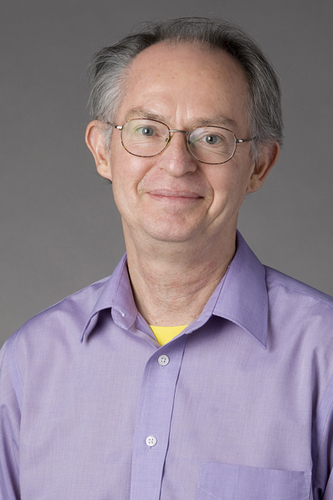
Roger Jackson
Carleton College, Emeritus
Roger Jackson is John W. Nason Professor of Asian Studies and Religion, Emeritus, at Carleton College. He also has taught at the University of Michigan, Fairfield University, McGill University, and Maitripa College. He has a BA from Wesleyan University and an MA and PhD from the University of Wisconsin, where he studied under Geshe Lhundub Sopa. His books include Is Enlightenment Possible? (1993), Tibetan Literature (with José Cabezón, 1996), Buddhist Theology (with John Makransky, 1999), Tantric Treasures (2004), The Crystal Mirror of Philosophical Systems (with Geshe Sopa et al., 2009), and Mahāmudrā and the Bka’ brgyud Tradition (with Matthew Kapstein, 2011). He is a past editor of the Journal of the International Association of Buddhist Studies, and currently co-edits the Indian International Journal of Buddhist Studies. He is in the final stages of preparing a major study and anthology centered on Mahāmudrā theory and practice in the Geluk tradition.

Anthony Chapman
Tsadra Foundation (Vice-President and Director of Contemplative Scholarships)
Anthony Chapman, (Lama Drupgyu Tenzin), a student of Kalu Rinpoche since 1972, and a monk from 1974 to 1995, participated in the first traditional three-year retreat for Westerners from 1976 to 1980, in France. Kalu Rinpoche subsequently appointed him as Lama of his center in Paris, and later Lama Drupgyu became the first westerner to be appointed Druppön, or Retreat Master, leading three-year retreats on Saltspring Island, Canada. Subsequently, he participated for six years in the translation of Jamgon Kongtrul’s Treasury of Knowledge. Anthony Chapman assisted in the establishment of Tsadra Foundation and was Director of Programs from 2000 to 2012. In 2010 he managed the transition of Tsadra Foundation’s Contemplative Program into the Advanced Contemplative Scholarships–supporting three-year retreatants around the world. He currently serves as Vice-President of the Foundation as well as Director of Contemplative Scholarships.
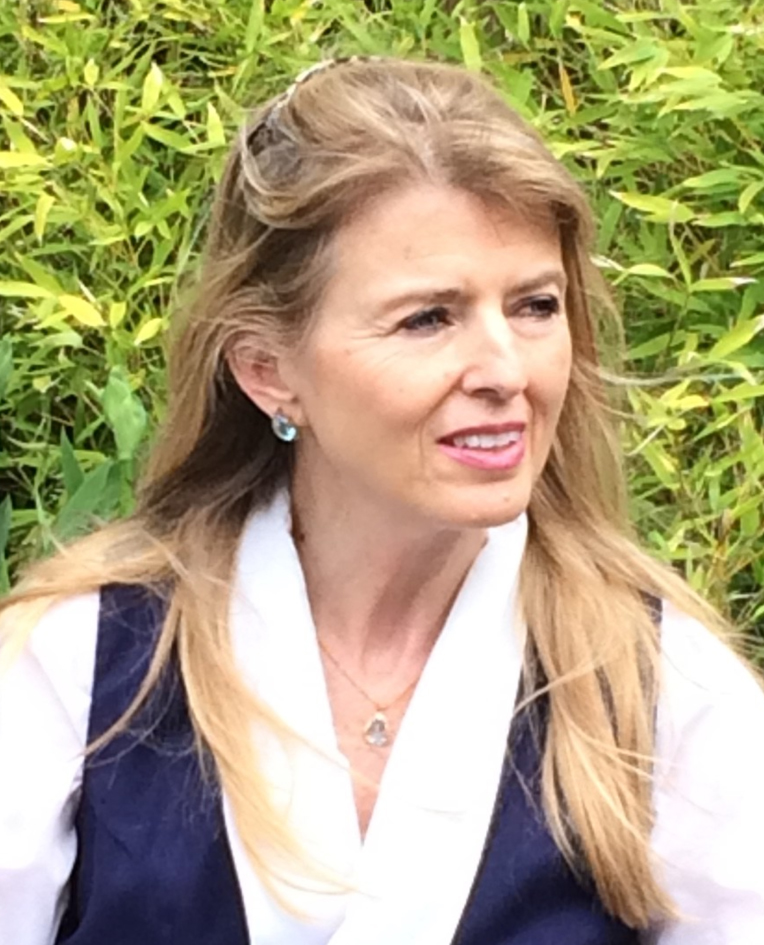
Sangye Khandro
Light of Berotsana
Sangye Khandro has been a Buddhist since 1971 and a translator of the Dharma since 1976. She has helped to establish numerous centers in the US and founded Light of Berotsana Translation Group in 1999. Sangye has served as translator for many prominent masters over the years: Düdjom Rinpoche, Penor Rinpoche, Jigme Phuntsok Rinpoche, Dungsei Thinley Norbu Rinpoche, Yangthang Tulku Rinpoche, and has been Khenchen Namdrol Rinpoche’s translator for twenty years. She has translated a number of important books including Precious Treasury of the Genuine Meaning, Dudjom Lingpa’s Chod, the Guhyagarbha Tantra Series, Yeshe Lama, Sole Essence of Clear Light, The Lives and Liberation of Princess Mandarava, Troma Nagmo Chod Liturgy series, Chetsun Nyingthig Liturgy series and many commentaries on the subject of the Great Perfection. Sangye lives at Tashi Choling retreat center in Ashland Oregon where together with Lama Chonam she continues to engage in translation work as well as teaching and leading retreats in the US and abroad.
Jeffrey Hopkins
UMA Institute for Tibetan Studies
Jeffrey Hopkins is Professor Emeritus of Tibetan Buddhist Studies at the University of Virginia where he taught Tibetan Buddhist Studies and Tibetan language for thirty-two years from 1973. He received a B.A. magna cum laude from Harvard University in 1963, trained for five years at the Lamaist Buddhist Monastery of America in Freewood Acres, New Jersey, USA (now the Tibetan Buddhist Learning Center in Washington, New Jersey), and received a PhD in Buddhist Studies from the University of Wisconsin in 1973. He served as H.H. the Dalai Lama’s chief interpreter into English on lecture tours for ten years, 1979-1989. At the University of Virginia he founded programs in Buddhist Studies and Tibetan Studies and served as director of the Center for South Asian Studies for twelve years. He has published thirty-nine books in a total of twenty-two languages, as well as twenty-three articles. Recently, Professor Hopkins has established the UMA Institute for Tibetan Studies and is working on translation projects related to the Gomang Project, among others.
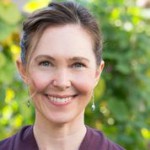
Willa Miller
Harvard University
L. Willa Miller, PhD is a Buddhist teacher and scholar. She has practiced Buddhism since 1980, eventually training in both monastic and academic contexts. She is the founder and spiritual director of Natural Dharma Fellowship in Boston and its retreat center Wonderwell Mountain Refuge in Springfield, NH, and is also currently Visiting Lecturer on Buddhist Ministry at Harvard Divinity School. She has been an interpreter and translator in Dharma contexts for many years. Her books include Essence of Ambrosia (a translation of Taranatha’s lam rim), and The Arts of Contemplative Care (Wisdom Publications). She has also written for Buddhadharma, Journal of the International Association for Buddhist Studies, and other journals. She has completed two three-year retreats. www.naturaldharma.org
Kurtis Schaeffer
University of Virginia
Kurtis R. Schaeffer received an MA in Buddhist Studies from the University of Washington in 1995, a PhD in Tibetan and South Asian Religions from Harvard in 2000 and is now an associate professor of Tibetan and Buddhist Studies at the University of Virginia. His books include Sources of Tibetan Tradition (2013), The Tibetan History Reader (2013), The Culture of the Book in Tibet (2009), An Early Tibetan Catalogue of Buddhist Literature (2009), Dreaming the Great Brahmin (2005), and Himalayan Hermitess (2004).
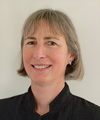
Elizabeth Callahan
Tsadra Foundation Fellow
Elizabeth has been engaged in contemplative training and Tibetan Buddhist studies for more than 35 years. A Tsadra Fellow since 2002, she has engaged in both written translation and oral interpretation including working closely with Khenpo Tsültrim Gyamtso, as well as completing two three-year retreats at Kagyu Thubten Chöling, New York. Elizabeth specializes in translating texts related to mahāmudrā and esoteric tantric commentaries and has published the Ninth Karmapa’s Mahāmudrā: Ocean of Definitive Meaning, Jamgön Kongtrul’s The Treasury of Knowledge Book 6, Part 3, and the third Karmapa Rangjung Dorje’s Profound Inner Principles (with Kongtrul’s commentary). She is currently working on Dakpo Tashi Namgyal’s Moonbeams of Mahāmudrā (Phyag chen zla ba’i ‘od zer) and the Ninth Karmapa’s Dispelling the Darkness of Ignorance (Ma rig mun sel). Elizabeth is also the Director of Advanced Study Scholarships at Tsadra Foundation and is the executive director of Marpa Foundation.
Alex Berzin
The Berzin Archives
Alexander Berzin began his study of Buddhism in 1962 and received his PhD from Harvard in 1972. He was resident in India for twenty-nine years, primarily with the Translation Bureau at the Library of Tibetan Works & Archives in Dharamsala. He has studied with masters from all four Tibetan Buddhist traditions; however, his main teachers have been His Holiness the Dalai Lama, Tsenshap Serkong Rinpoche, and Geshe Ngawang Dhargyey. He was the principal interpreter for Serkong Rinpoche for nine years and has served as occasional interpreter for the Dalai Lama. An international lecturer on Tibetan Buddhism since 1980, he has published seventeen books and is the author and executive director of www.berzinarchives.com, an encyclopedic website containing his collected translations, books, and lectures on Tibetan Buddhism, history, culture, and Buddhist-Muslim relations. The website currently contains nineteen language sections, with two more underway. He has been living in Berlin, Germany since 1999.
Stephen Gethin
Padmakara Translation Group; Tsadra Foundation Fellow
Stephen studied veterinary medicine at Cambridge University, where he was also awarded a choral exhibition, a position he was subsequently obliged to resign when his interest in Buddhism grew to the point where he had to choose between meditation classes and Sunday evensong. After a number of years in professional practice, during the 1980s he undertook two three-year retreats in France, where he now lives. He became a Tsadra Foundation Translation Fellow in 2005. His published translations include Nagarjuna’s Letter to a Friend, Zurchungpa’s Testament, A Torch Lighting the Way to Freedom, and Jamgön Mipham’s commentary on the Mahāyāna-sūtrālaṃkāra, A Feast of the Nectar of the Supreme Vehicle (2018). He is currently working on the sixteenth volume of the gdams ngag rin po che’i mdzod, and a detailed preliminary practice commentary by Shechen Gyaltsap.
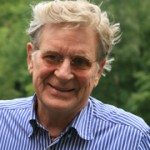
Robert Thurman
AIBS; Columbia University
Dr. Robert Thurman holds the Jey Tsong Khapa Chair in Indo-Tibetan Buddhist Studies at Columbia University. After education at Philips Exeter and Harvard, he studied Tibet and Tibetan Buddhism for fifty years as a personal student of H.H. the Dalai Lama and numerous other Mongolian and Tibetan teachers. He has written both scholarly and popular books, and has lectured all over the world. His special interest is in the history of Buddhism as a set of socially revolutionary, educational institutions, as well as in the Indo-Tibetan philosophical and psychological traditions, as alive in relevance to parallel currents of contemporary thought and science. He is also the president of Tibet House US, the president of the American Institute of Buddhist Studies, and the Editor-in-Chief of the “Treasury of the Buddhist Sciences.” His own published translations include the Vimalakīrti Sūtra, Tsong Khapa’s Essence of True Eloquence, and his Brilliant Illumination of the Lamp of the Five Stages.
David Germano
University of Virginia
David Germano teaches and researches Tibetan and Buddhist Studies at the University of Virginia, and is director of the Tibetan and Himalayan Library, the Tibet Center, the UVa Contemplative Sciences Center, the Tibet Participatory Culture Initiative, and SHANTI (Social Sciences, Humanities, and Arts Network of Technological Initiatives). His personal scholarship focuses on the history of Tibetan culture and Buddhism from the ninth to fourteenth century with a special focus on esoteric religious movements. With the Tibet Center he has directed exchange programs between China and the US in relationship to Tibetan communities. Under the Tibet Participatory Culture Initiative, he is working to use technology to support bridges between academics and development projects, and to enable local communities to use modern tools as vehicles for their own self-expression and empowerment. At UVa, he is coordinating a pan-University exploration of contemplation in learning and research. Germano is currently working on a fourfold set of works on the Great Perfection Seminal Heart (rdzogs chen snying thig) tradition.
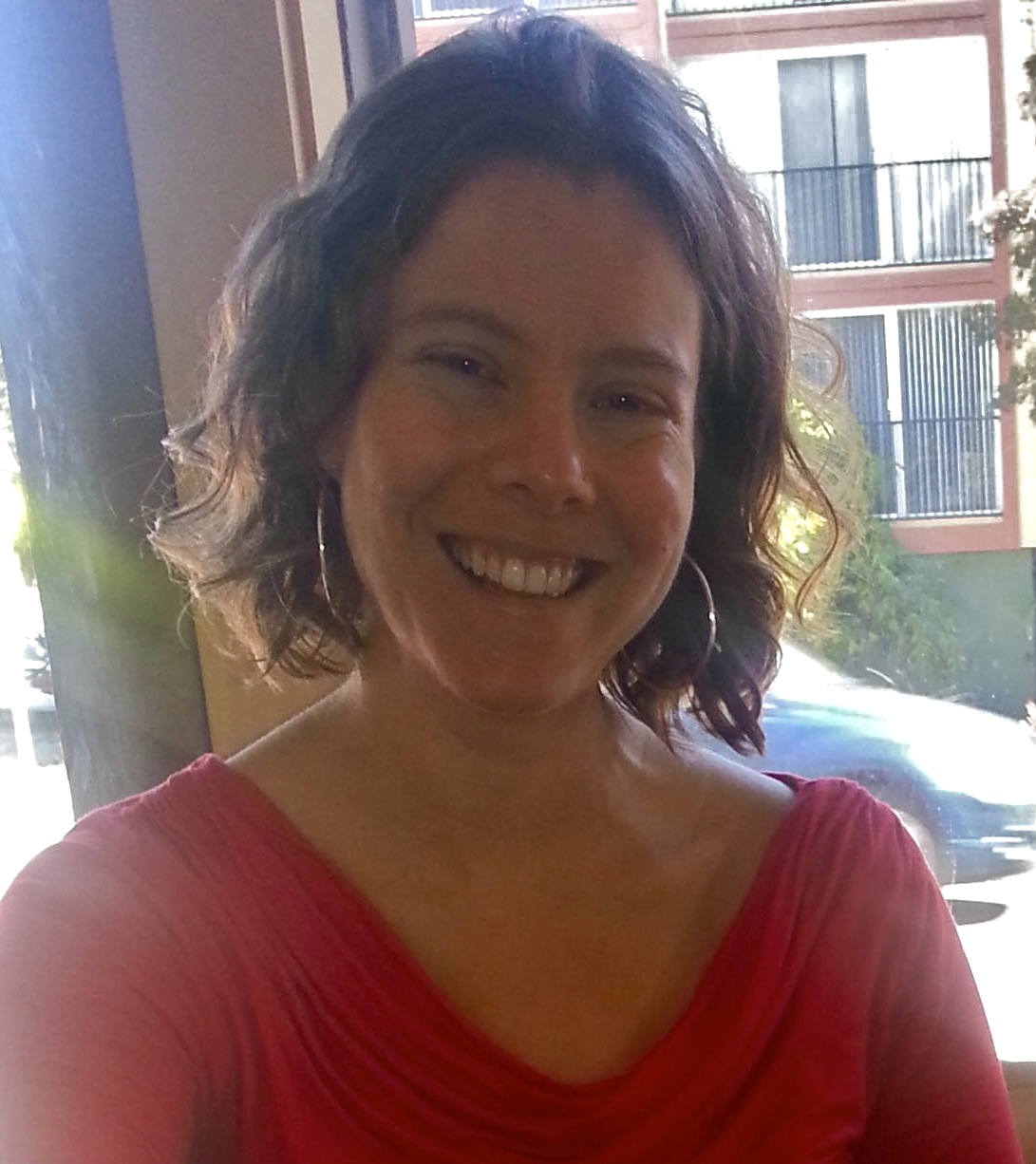
Catherine Dalton
Dharmachakra Translation Committee; UC Berkeley
Catherine is an oral interpreter and a translator for the Dharmachakra Translation Committee. She has published a number of translations with Dharmachakra, including several for 84000. Catherine studied and taught at the Rangjung Yeshe Institute in Nepal for a number of years, and is the co-director of the Dharmachakra Center for Translation and Translation Studies at Rangjung Yeshe Gomde, CA. She holds an MA in Buddhist Studies from Kathmandu University, and is currently a doctoral student in Buddhist Studies at UC Berkeley.
Richard Barron (Chokyi Nyima)
Tsadra Foundation Fellow
Richard Barron (Chökyi Nyima) has been a student of Buddhism for more than forty years. He undertook a three-year retreat from 1976 to 1980, and has served as interpreter for lamas from all four schools of the Tibetan Buddhist tradition. He has been involved in a long-term project to translate the Seven Treasuries of Longchenpa into English; the fifth volume, The Treasury of Words and Meanings (Tshig don mdzod) will be published in 2014. Richard has been a Tsadra Foundation Fellow since 2000, and is currently working on the Foundation’s DNZ Project, translating the two volumes of teachings from the Nyingma tradition.

Gyurme Dorje
Tsadra Foundation Fellow; 84000
Gyurme Dorje holds a PhD in Tibetan Literature (SOAS) and an MA in Sanskrit with Oriental Studies (Edin). Since 1970 he has been writing, editing, translating, and contributing to numerous books on diverse aspects of Tibetan culture, including Buddhist philosophy, history, geography, medicine, art, divination, and travel.
Ian Coghlan
Institute of Tibetan Classics; Monash Sophis
Dr. Ian Coghlan is an adjunct research fellow at the School of Philosophical, Historical and International Studies (SOPHIS), Monash University, Melbourne, and a translator for the Institute of Tibetan Classics. He holds a PhD in Asian Studies from La Trobe University, focussing on Buddhist metaphysics, ethics, and hermeneutics. He trained as a monk in the Tibetan Buddhist tradition for twenty years and completed his studies at Jé College, Sera Monastic University in 1995. He has translated and edited a number of Tibetan works including Ornament of Abhidharma, Principles of Buddhist Tantra, Stairway to the State of Union, and Hundreds of Deities of Tushita. He currently resides in Churchill, Victoria with his partner, Voula, and dog, Pilar.
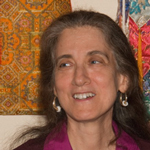
Anne Klein
Rice University
Anne Carolyn Klein/Rigzin Drolma, Professor and Former Chair of Religious Studies, Rice University, and Founding Director of Dawn Mountain, (www.dawnmountain.org). Her six books include Heart Essence of the Vast Expanse: A Story of Transmission; Meeting the Great Bliss Queen, Knowledge & Liberation, and Paths to the Middle as well as Unbounded Wholeness with Geshe Tenzin Wangyal Rinpoche. She has also been a consulting scholar in several Mind and Life programs. Her central thematic interest is the interaction between head and heart as illustrated across a spectrum of Buddhist descriptions of the many varieties of human consciousness.

